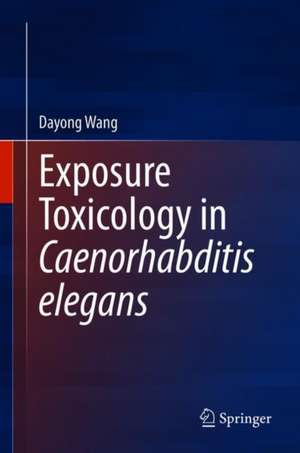Exposure Toxicology in Caenorhabditis elegans
Autor Dayong Wangen Limba Engleză Hardback – 28 aug 2020
| Toate formatele și edițiile | Preț | Express |
|---|---|---|
| Paperback (1) | 1019.91 lei 39-44 zile | |
| Springer Nature Singapore – 28 aug 2021 | 1019.91 lei 39-44 zile | |
| Hardback (1) | 1046.79 lei 39-44 zile | |
| Springer Nature Singapore – 28 aug 2020 | 1046.79 lei 39-44 zile |
Preț: 1046.79 lei
Preț vechi: 1101.88 lei
-5% Nou
Puncte Express: 1570
Preț estimativ în valută:
200.31€ • 206.65$ • 167.15£
200.31€ • 206.65$ • 167.15£
Carte tipărită la comandă
Livrare economică 24-29 martie
Preluare comenzi: 021 569.72.76
Specificații
ISBN-13: 9789811561283
ISBN-10: 9811561281
Pagini: 682
Ilustrații: XIX, 682 p. 447 illus., 303 illus. in color.
Dimensiuni: 155 x 235 mm
Ediția:1st ed. 2020
Editura: Springer Nature Singapore
Colecția Springer
Locul publicării:Singapore, Singapore
ISBN-10: 9811561281
Pagini: 682
Ilustrații: XIX, 682 p. 447 illus., 303 illus. in color.
Dimensiuni: 155 x 235 mm
Ediția:1st ed. 2020
Editura: Springer Nature Singapore
Colecția Springer
Locul publicării:Singapore, Singapore
Cuprins
1. Exposure Durations of Environmental Stresses or Toxicants.- 2. Exposure Stages of Environmental Stresses or Toxicants.- 3. Complex Exposures to Environmental Toxicants or Stresses.- 4. Transgenerational Toxicity of Environmental Toxicants or Stresses.- 5. Exposure Routes of Environmental Toxicants.- 6. Basic Endpoints for Toxicity Assessment of Environmental Toxicants or Stresses.- 7. Endpoints for Assessing the Toxicity on Primary Targeted Organs.- 8. Endpoints for Assessing the Toxicity on Secondary Targeted Organs.- 9. Endpoints for Assessing the Toxicity on Biochemical Processes.- 10. Endpoints for Assessing the Genotoxicity and the Genetic Toxicity.- 11. Role of Exposure Dose in Toxicity Induction of Environmental Toxicants or Stresses.- 12. Role of Environmental Factors in Toxicity Induction of Environmental Toxicants or Stresses.- 13. Effects of Environmental Sample Forms on Toxicity Induction.- 14. Roles of Physicochemical Properties of Toxicants in Toxicity Induction.- 15. Roles of Environmental Media and Chemical Transformations of Environmental Toxicants in Toxicity Induction.- 16. Bioavailability, Enrichment, and Translocation of Environmental Toxicants.- 17. Susceptibility to Toxicants or Stresses Induced by Genetic Mutations.- 18. Contributors to Amplify the Toxicity of Toxicants or Stresses.- 19. Exposure to Certain Environmental Stresses.- 20. High-Throughput Toxicity Assessment.- 21. Toxicity Assessment under the Pathological Conditions.
Notă biografică
Dr. Dayong Wang is a Professor at the Medical School, Southeast University, China. He obtained his Ph.D. from Peking University in 2001 and completed his postdoctoral training at the University of Toronto from 2002 to 2004. His research focuses on toxicology and pathology using Caenorhabditis elegans as a model animal, fields in which he has published more than 160 research articles.
Textul de pe ultima copertă
This book focuses on exposure toxicology in C. elegans. The nematode Caenorhabditis elegans is sensitive to various environmental toxicants and stresses, and has proven to be an important animal model in both molecular and target-organ toxicology. As a result, over the past 30 years, there has been extensive research on the exposure to environmental toxicants or stresses in nematodes. Based on the available data, the book offers an introduction to the exposure system established in nematodes, discussing various aspects of endpoints that can potentially be used to assess the toxicity of environmental toxicants or stresses. Also exploring various factors affecting toxicity induction, and exposure to environmental toxicants and stresses, it allows readers to gain a systematic understanding of exposure toxicology in C. elegans.
Caracteristici
Broadens readers understanding of toxicology in C. elegans Offers insights into exposure toxicology in C. elegans Covers various endpoints that can potentially be used to assess the toxicity of environmental toxicants or stresses
